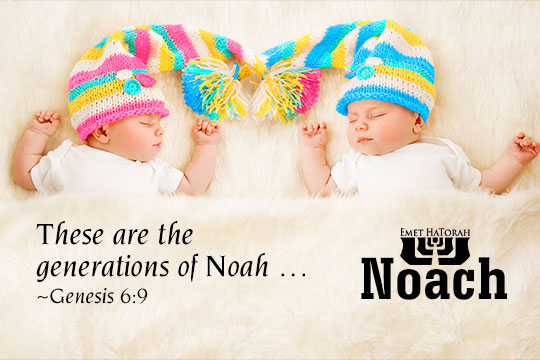Parashat Noach - Genesis 6:9-11:32
Series:

Leaving A Legacy
Our parasha opens with the words, “These are the generations of Noah. Noah was a righteous man, blameless in his generation. Noah walked with God” (Genesis 6:9). In this passage, the word “generations” is the Hebrew word toldot (תולדת). Most of the time the word toldot is used in the Scriptures it is in relationship to genealogy, since its primary meaning is descendants or offspring. For instance, toward the end of this week’s parasha we read, “These are the generations of Shem” (Genesis 11:10). Immediately following is a list of Shem’s descendants. When it comes to Terach it repeats this pattern saying, “Now these are the generations of Terah” (Genesis 11:27) followed by a list of his children. It is the same when it lists the sons of Ishmael in Genesis 25, etc.
However, in the case of the Bible’s description of Noah (and a few other select individuals), rather than listing his children, his character traits are listed instead. It appears that the Scriptures are emphasizing that more than his literal offspring—the very ones that would repopulate the world after the flood—the legacy of Noah was to be found in his character. The Scriptures list three “offspring” of Noah: his righteousness, his blamelessness and his relationship with God. Let’s briefly explore these concepts.
Noah was righteous. What does this mean? Righteousness is a legal status by which one person is declared to be in right relationship with another. It means that Noah held to the standard which the Lord had given him, as it is written, “The Lord tests the righteous, but his soul hates the wicked and the one who loves violence … For the Lord is righteous; he loves righteous deeds; the upright shall behold his face.” (Psalm 11:5, 7). When the Lord told Noach to enter into the ark, he reminded Noah of his righteousness by saying, “Go into the ark, you and all your household, for I have seen that you are righteous before me in this generation” (Genesis 7:1).
Noah was blameless. What does this mean? A person is blameless when they avoid the things that displease God. For instance, when the Children of Israel were about to enter into the Promised Land, the Lord commanded them saying, “You shall be blameless before the LORD your God” (Deuteronomy 18:13). He desired that they no follow the abominations of the nations they were about to dispossess. The Lord qualifies what it means to be blameless by saying, “For these nations, which you are about to dispossess, listen to fortune-tellers and to diviners. But as for you, the LORD your God has not allowed you to do this” (Deuteronomy 18:14). Although there was wickedness all around him, Noah stood firm and did not succumb to the temptation to reduce his religious observance to the lowest common denominator of his environment.
Noah walked with God. What does this mean? God desires that His children walk with him. The prophet Micah tells us this saying, “He has told you, O man, what is good; and what does the LORD require of you but to do justice, and to love kindness, and to walk humbly with your God?” (Micah 6:8). Walking with God is an idiom for faithfulness, as the Scriptures tell us, “Ephraim has surrounded me with lies, and the house of Israel with deceit, but Judah still walks with God and is faithful to the Holy One” (Hosea 11:12).
Although Noah lived in a wicked generation, yet he was a righteous man, blameless in his generation and walked with God. What can we say of ourselves? Are we righteous, blameless and walking with God? How will our toldot be remembered?








